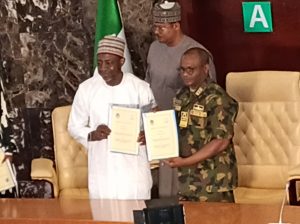
The Chief of Naval Staff (CNS), Vice Adm. Auwal Gambo, and the Executive Vice Chairman, National Agency for Science and Engineering Infrastructure (NASENI), Prof. Mohammad Haruna, during the signing of Memorandum of Understanding (MoU) at Naval Headquarters in Abuja, on Wednesday (8/3/23).
By Sumaila Ogbaje
The Nigerian Navy and the National Agency for Science and Engineering Infrastructure (NASENI), have signed a Memorandum of Understanding (MoU) to develop navys capacity in ship building and maritime technology.
The News Agency of Nigeria (NAN) reports that the Executive Vice Chairman of NASENI, Prof. Mohammad Haruna and the Chief of Naval Staff (CNS), Vice Adm. Auwal Gambo, sealed the deal at Naval Headquarters Abuja, on Wednesday.
Gambo said the MoU was another milestone in the Nigerian Navys efforts at strengthening interagency collaboration for enhanced security within the nations maritime domain.
The CNS commended NASENI for changing the dynamics of engineering, and facilitating research and development initiatives across sectors in the country and beyond.
He said that as part of the collaboration, a NASENI team had visited the Naval Dockyard in Lagos to refine the Nigerian Navys local shipbuilding, construction and fabrications for the maritime industry.
According to him, the indigenous shipbuilding effort has enhanced the presence of the Nigerian navy at sea which led to significant reduction of piracy.
Gambo said that the efforts had culminated into the delisting of Nigeria from the international list of piracy-prone countries in the world.
This has ultimately reduced high insurance premium which is known as risk premium, usually factored into shipping costs due to prevalence of piracy incidents around any part of the world.
These high costs are passed on the consumers, you and I, which enables shipping companies recoup their losses, as it were.
Now the good news is that prior to delisting Nigeria from the International Maritime Bureau list of piracy prone countries in March last year, the insurance premium has been reduced from ,000 to .
I assure you that the Nigerian navy will sustain this feat by the grace of God, he said.
The Naval chief said the MoU would re-ignite partnership between both organisations in several ways, including research and development for enhanced security.
He added that it would also foster operations and administrative engagements to achieve sustainable blue economy for Nigeria.
Gambo said the sustained efforts and support from the federal government was instrumental to the successes recorded by the Nigerian navy and thanked President Muhammadu Buhari for his unflinching support.
I wish to assure you that the Nigerian Navy is well positioned to meet the terms of this unprecedented memorandum of understanding and I look forward to a mutually beneficial partnership for the benefit of our great country.
I therefore, implore both parties, the Nigerian Navy and NASENI to be committed towards the attainment of the objectives of the memorandum of understanding for the good of Nigeria and benefit of Nigerians, he added.
The Executive Vice Chairman of NASENI, Prof. Mohammad Haruna, said the MoU would help to save foreign exchange and produce what was needed locally to enhance national security.
Haruna commended the Navy for its creativity and ingenuity in developing local capacity.
He said that the Navys stride at its Dockyard in Lagos would ease the collaboration in terms of research, fabrication of spare parts and ship building.
According to him, the MoU will provide tangible results for the benefits of our country,
The Chief of Policy and Plans (Navy), Rear Adm. Suleiman Garba, said the MoU was a milestone in the joint technology revolution in Nigeria.
Garba said that the navy needed fruitful partnership with technological agencies such as NASENI to aggregate their human and financial resources to be self reliant.
Also speaking, the Chief of Naval Engineering, Rear Adm. Suleiman EL-Ladan, said the MoU was designed to harmonise the capacity of the navy and NASENI to take ownership of engineering and technical development for Nigeria.
El-Ladan said the arrangement started in 2016, adding that the two parties would constitute a joint implementation committee to ensure proper execution of the MoU.
According to him, under the agreement, the Nigerian navy will provide research and development focus areas, capacity to start off, design and construction of fishing vessels as well as oil tankers.
He said the MoU had a five-year lifespan, after which it would be expanded. (NAN) ()
Edited by Benson Iziama/Maharazu Ahmed
============================
Source: NAN News